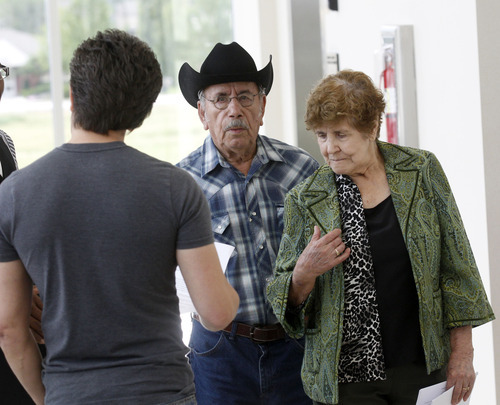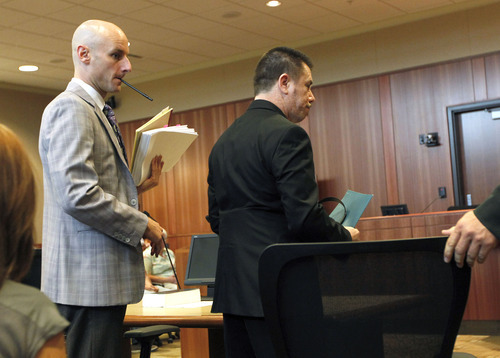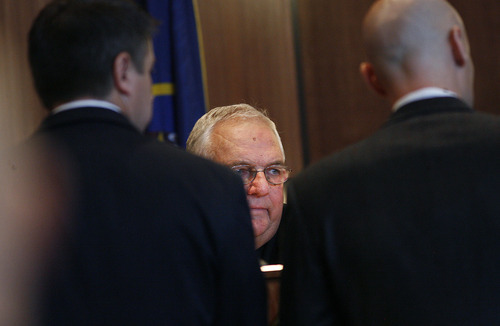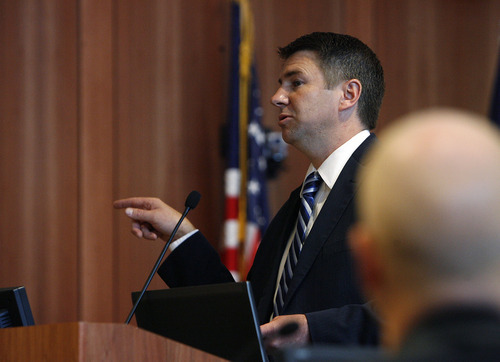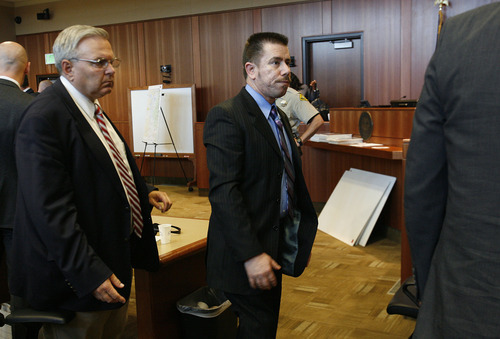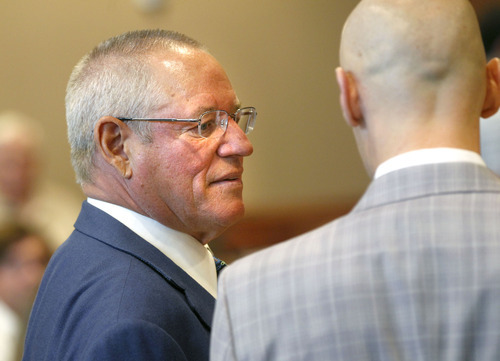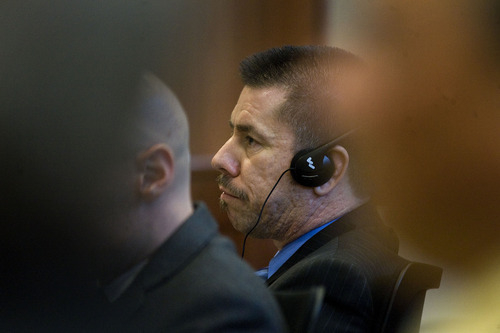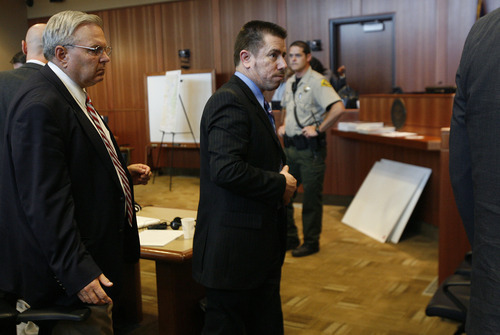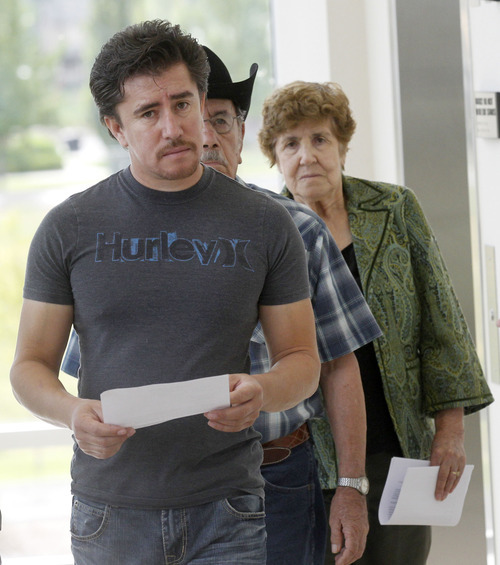This is an archived article that was published on sltrib.com in 2012, and information in the article may be outdated. It is provided only for personal research purposes and may not be reprinted.
Keara Brown moved to Delta just months before the shooting. She never knew Deputy Josie Greathouse Fox.
But Brown watched the convoy of cars and motorcycles stretch from one end of town to the other, along streets lined with people and under a canopy of stars and stripes, as the Millard County deputy was laid to rest in 2010.
"I'm outraged," Brown, the manager of the Delta Freeze eatery, said Saturday morning by telephone as she prepared for the lunch crowd. "It's going to hit the town hard again."
A community's 2½-year wait for justice ended abruptly in the waning hours of Friday night, inside a courthouse nearly a hundred miles away from the tiny central Utah town, where Fox was shot and killed during a January 2010 traffic stop.
After a week of testimony and eight hours of deliberation, a 4th District Court jury in Spanish Fork found Roberto Miramontes Román not guilty of murdering the deputy, a slaying to which he had confessed to police only a day after Fox's death.
Instead of joining the seven other men currently in prison for killing Utah peace officers, Román became the first person acquitted of a police shooting in Utah since 1973, when a jury acquitted Robert Roll of killing Salt Lake County sheriff's Deputy Melvin Colebrook.
Instead of facing a life sentence, Román now faces a maximum of 10 years in prison for illegally having guns and for later throwing those guns out of his car as he fled toward Salt Lake City with a friend, Rubén Chávez-Reyes. The accomplice, who was convicted of second-degree felony obstruction for picking Román up outside Nephi and taking him to Salt Lake City and later Beaver, could be held for up to 15 years.
"She's gone, and there's nobody held responsible to pay for that," said Melissa Fritz Fuller, a former Iron County sheriff's deputy who roomed with Fox during Police Officer Standards and Training. "What I don't understand is that in the long run the good guys are supposed to win, and we did not."
"I didn't see it coming," she said through tears Saturday morning. "I know what the evidence is. I know what it leads to."
As the Greathouse family hoped for closure at trial, shock overtook the proceedings Thursday afternoon when Román took the witness stand in his own defense.
Earlier in the trial, deputies had testified to the events of early Jan. 5, 2010.
Millard County sheriff's Sgt. Rhett Kimball said he saw two vehicles meet on a road near McCornick, a smattering of houses so small it's considered rural even among Millard residents. When the cars left in different directions after a few minutes, Kimball told Fox to stop the Cadillac because he knew the other car belonged to her brother, Ryan Greathouse.
A day after the shooting, Román was caught hiding out in a shed near Beaver. He was arrested and, during an interview with detectives at the Beaver County jail, he gave a full confession.
But on the witness stand, Román shocked prosecutors by changing his story, telling jurors that it was Greathouse, Fox's brother, who killed the deputy.
That night, police and prosecutors returned to the Cadillac and conducted informal tests to see how plausible the story was. Deputy Millard County Attorney Pat Finlinson said it would have been nearly impossible for a man of Greathouse's size to kneel down on the floor of the Cadillac, as Román had said he'd done. Furthermore, the prosecutor told jurors, the angles of the two bullets that hit Fox in the chest were consistent with the driver bringing an AK-47 across his chest, almost turning the weapon upside down, and firing just behind him — not with a crouched passenger.
Finlinson also questioned Román about the unidentified third person he said drove Greathouse's truck away from McCornick that night and whether he could have made the 22.83-mile drive from the scene to Greathouse's home in Leamington in the nine or 10 minutes he said that it took.
There was physical evidence, too: Fox's DNA was on the Cadillac. Román's fingerprints were on the gun. But that was consistent with the man's testimony.
"I think Román's testimony was what this case was all about," defense attorney Stephen McCaughey said Friday night.
Jury forewoman Nicole Kay described deliberations as "intense."
"Have you ever seen '12 Angry Men'?" she asked.
As the hours went on, Kay said doubts began to pile up. Jurors had questions about Greathouse, who died of a drug overdose four months after Fox's killing, that went unanswered by the evidence, Kay said.
The forewoman said she wished the jury could have "trusted our gut" and expressed sorrow for the Greathouse family. But, she said, that doubts persisted.
"We could not rule out the possibility that that story [told by Román] could be true," she said.
Doug Fox, the husband of Josie Greathouse Fox, blamed the verdict on the judge, saying he had kept critical evidence from the jury. Judge Donald Eyre did not allow prosecutors to present Greathouse's four-page written statement to police, ruling that it was hearsay and therefor inadmissible.
That statement has not been made public, but court documents say Greathouse admitted to meeting Román and buying drugs from him that night.
Finlinson, the deputy prosecutor for the county of 13,000 in central Utah, stayed away from the courtroom as deliberations went on. After the jury returned with its first question — "If we cannot come to a unanimous verdict, how long do we stay here tonight?" — he appeared concerned.
A few hours later, there were no screams or shouts as the verdict was read, just the soft sounds of one family breathing in as another breathed out. They filed quietly out of the courtroom, where both families cried, for different reasons.
Román's family offered sympathies for the Greathouses on Saturday.
"It's hard for us to see the family suffer," Mike Román, the man's brother, said in a telephone interview. "We just wanted the truth to come out and give us a chance for Robert to explain himself what really happened. We don't feel like we won something."
Finlinson, Millard County Sheriff Robert Dekker and the Greathouse family left the courthouse looking sullen and did not speak to reporters.
"I wish there was something that could happen that was going to make it OK," Fuller said. "I understand nothing is going to bring her back. But is there anything that will make it OK?"
Twitter: @aaronfalk —
What's next for Roberto Miramontes Román?
• He is scheduled to be sentenced Oct. 10 in Spanish Fork for the two charges on which he was convicted: tampering with evidence and illegal weapons possession. Each count carries up to five years in prison.
• Román has been held in jail since his arrest on Jan. 6, 2010. The defense may ask Judge Donald Eyre to sentence Román to time served.
• After incarceration, it's unlikely Román, a Mexican national, will remain in the United States. He was deported for criminal convictions in 1998. He was arrested twice after that for illegally re-entering the United States.


